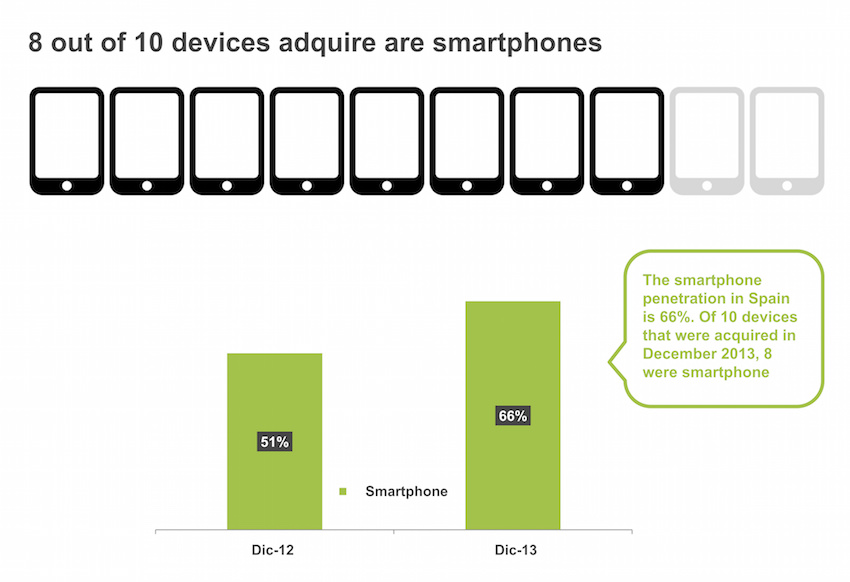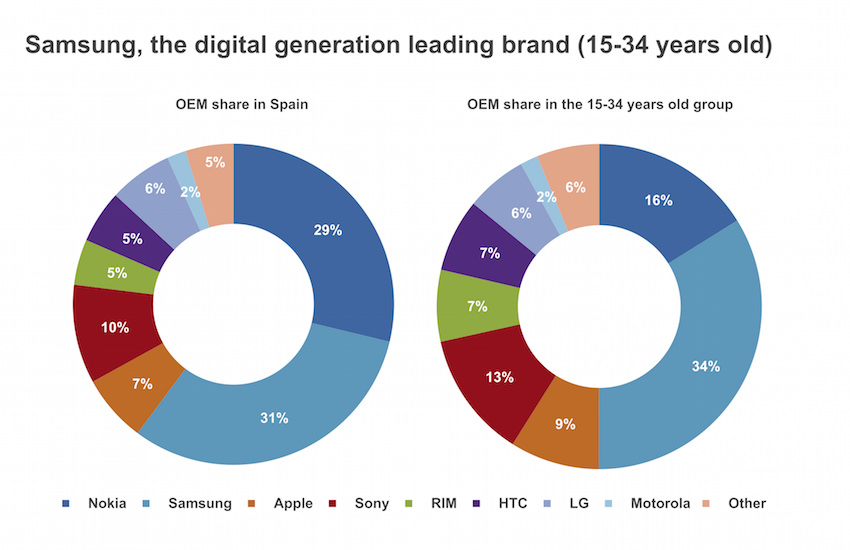The today's fragmentation of media is happening at an incredibly high speed on several platforms, especially in Spain. In the following will be explained why.
We are not only talking about computers anymore. We are talking about the increasing use of smartphones, tablets, gaming platforms and a variety of emerging devices.
People consume content anywhere, anytime and computers are no longer the center of the digital sphere. In fact, more time is currently spent on apps rather than on the web.

In all of this digital rush, the number of people that now use smartphones or tablets has increased by 70% in one year. According to a report by ‘Digital Nature’, Spain has become the European country with the highest penetration of smartphones and tablets, with over 66% (Penetration in EU5: UK, Germany, France, Spain, Italy is ‘only’ 55%).
The fact that Spain is a leader in penetration for smartphones and tablets in Europe has generated an ideal space for generating exclusive content for these types of devices like applications. This is the reason why so many companies from outside of Spain are now actively looking at the Spanish user. In a country with a major crisis like Spain, the app sector still has managed to break through despite the economic climate.
It is no surprise that Barcelona based companies like SocialPoint and King.com are experiencing rapid growth, opening up a world of opportunity for gaming geeks in the city.
On a commerce stand point, numbers also show that Spaniards have been ready for a long time for the digital era and are now fully embracing it. Access to social networks through mobile grew by 45% compared to a year ago. 10% of smartphone users bought a product or service from their devices; while 16% used them to compare prices between different establishments.
These figures give us a glimpse that trade via mobile is becoming a major trend in Spain.

The gaming industry is booming, social networking is rising, online trading has increasing by 2 digits every year. This sounds like a pretty idyllic situation. Which is a great thing considering how bad Spain got hit by the 2008 economic meltdown. With a 52% youth unemployment rate, Spain needs jobs, a lot of them.
This is why those figures are so encouraging for the younger generation or so called “Spain's lost generation”. The same generation which Spain would need in order to create new ideas, bring new investors and new companies.
And yet despite all of these incredibly encouraging numbers and potential job opportunities in the digital sphere, Spain remains an anomaly of its own.
Since 2008, it’s been proven that the old fashioned ways of accomplishing things are not working anymore, and yet the existing Spanish legislation just ousted two major foreign tech companies: Uber and Google News.

Everyone agrees that any business trying to enter a potential new market should respect the laws of that country. The problem is not here, the issue comes from the fact that some of the Spanish legislation are outdated. Outdated because we are living in an all thing digital era, and there is no going back.
Legislation needs to be adapted for startups or already established tech companies to invest and thrive in Spain. Innovation and disruptive change both imply adapting a few of the existing rules, and creating new ones, more adapted ones. Or everything else will stay the same.
They say that there is no such thing as short-term strategy. When starting a company or changing an existing company’s direction, you need a mission and a vision.
The same is meant for a country. Spain needs a vision. A vision against a far too present problematic protectionist trend in Spain. This same protectionism that scares off investors and foreign tech companies.
A new plan is needed, some of the current laws have to be adapted, new ones need to be created to let young companies thrive. The Spanish economy isn’t only about tourism and agriculture. Spain is a leader in major industries like renewable energy commercialisation (Iberdrola), technology (Telefónica), train manufacturing (AVE) and petroleum (Repsol).
It is also the second biggest foreign investor in Latin America after the US. Why wouldn’t it be a major player in the digital industry, too?
The Spanish government needs to take into consideration the new facts, a new situation that is affecting its society through the creation of digital solutions, products and strategies. This is the only way for Spain to build a future. There is no going back, and the sooner the Spanish government understands that, the better it is for its people.
